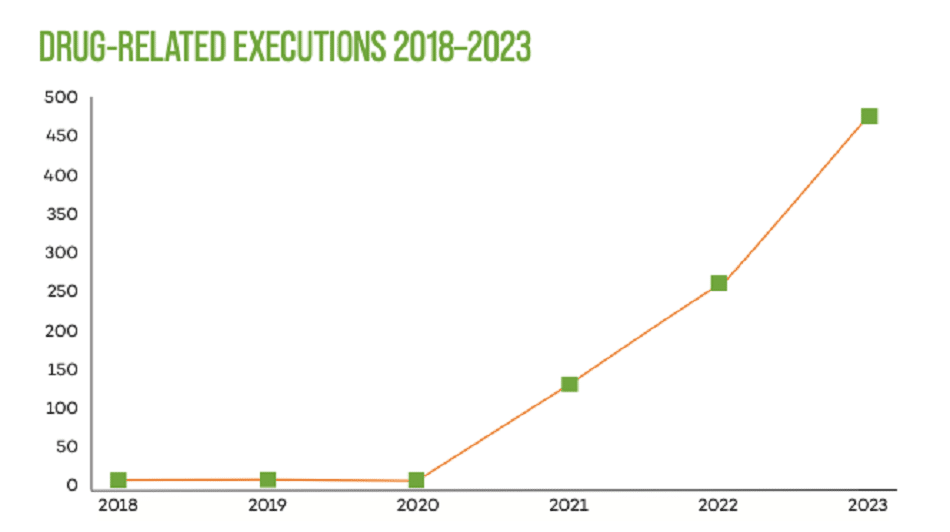
“Frightening” increase of executions in Iran
MENA
Iran Human Rights (IHRNGO) reports that at least 243 people, including 10 women, have been executed in 2024, as of 15 June. In 2023, the number of people executed has increased from 582 to 834. At least 471 people were executed for drug-related offenses. This represent a 84% increase compared to 2022 (256).
Global overview on drug-related executions in Iran
The UN High Commissioner for Human Rights said the situation in Iran was “frightening”.
IHRNGO recently reported that between 17 April and 15 May 2024, 103 people including 3 women were executed, 61 of them for drug related offenses.
The comparison with the years prior to 2021 is particularly interesting. Indeed, the 2017 reform of lethal anti-narcotics laws led to a real drop in the death penalty for drug offenses. For example, in 2019, 28 people were executed for drug offenses. The year 2021 marked a significant change with the new presidency of Ebrahim Raisi and the appointment of a new head of the judiciary, Gholamhossein Eje.
According to the Harm reduction International (HRI) report, in 2023, 98% of drug-related death sentences worldwide took place in Iran.
A closer look at the background of people executed reveals that certain communities are more prevalent than others.
Firstly, regarding minorities, a recent report by Amnesty International points out that the Baluch community accounted for 29% of those executed for drug offenses in 2023. Yet this minority represents only 2% to 6% of the Iranian population. This minority corresponds to Iran’s poorest province. However, Iranian justice takes no account of the specific circumstances leading to a death sentence for drug offenses.
The Kurdish minority is also affected by death sentences. IHRNGO reported that several Kurdish-Sunni were executed in 2024.
IHRNGO also reported that 3 women were executed for drug offenses in 2023. Their annual report explains the case of Zarkhatoun Mazarzehi. She was executed on 15 November 2023, for transporting raw materials cosmetics products which were taken for drugs.
Brian Egan has studied the place of foreign nationals among those sentenced to death for drug trafficking. His report shows that foreign nationals on the Iranian border are particularly affected by arrests. Indeed, Afghanistan and Pakistan are part of the drug trafficking route. Brian Egan also raises the question of people carrying drugs, who are not entitled to the presumption of innocence. They are therefore declared guilty even if they are not. Mr. Ali Zehi investigated a village in Afghanistan that lost 1,000 inhabitants kidnapped to participate in the drug trade.
An alarming justice system
All this executions are initiated by the Iranian justice system.
The Iranian death penalty system has been analyzed in by the Abdorrahman Boroumand Center for Human Rights in Iran.
“It exposes the idiosyncratic practices of the judiciary and its decision-making, using cases concerning the death penalty for drug offenses—its imposition prohibited long under international standards. These judgments repeatedly use the language of ‘certainty’ in convicting the accused. In reality, they raise serious concerns about miscarriages of justice that could potentially result in the erosion of legitimacy of the criminal ‘justice’ system in Iran.”
For example, the judgments of Mohsen Nasiri Mojreh totally lack the necessary details required to enable the defendants and their legal team to understand the reasons behind the judgment and, if necessary, to prepare for an appeal.
In addition, the report insists on the issue of confession becoming a conviction. “The defendants commonly confess to offenses they had not committed; the most obvious reason being forced confessions through the use or the threat of torture. For example, Majid Parmasi and Mikael Shahbazi were sentenced to death for the manufacture and possession of approximately 6.2 kilograms of crystal meth. The judge sentences these defendants to death by focusing on their confessions during the investigation phase—and by disregarding the defendants’ subsequent retraction.”
A low political cost
Executions for drug offenses have a relatively low political impact. Indeed, unlike executions of political opponents, the drug offense charge is less political. This is why, as the IHR report states, when political events such as the “Women, Life, Freedom” movement take place, executions for drug trafficking increase. As the trials are very quick and not very rigorous, this makes it possible to incriminate quickly and without impact.
This low political cost is accentuated by the fact that the people sentenced to death come from marginal populations. Moreover, the silence of the international community highlights the low political cost. The UNODC even signed a new agreement with Iran in March 2023. This agreement, analyzed by the IHR report, strengthens the Iranian police system, which could lead to further arrests.
So, death sentences for drug offenses have little political impact. It allows Iran to hide political persecution and avoid political issues.
International and national reaction to the situation
Reports from various NGOs urge the international authorities to act to change the situation. Several initiatives have been launched to denounce the Iranian situation.
On a national scale, IHR reports demonstrations by victims’ families. A demonstration took place in January 2023. And in January 2024, prisoners at Ghezel Hesar prison called for help. On a national scale, these mobilizations are dangerous since activists are imprisoned for denouncing the death penalty. This is the case of the activist Golrokh Ebrahimi-Irae, who has been in prison since 2022.
On an international scale, a Report of the Office of the United Nations High Commissioner for Human Rights by the High Commission for Human Rights reminds in paragraph 30 that the death penalty should not be applied for drug trafficking. The report also called for a halt to the wars on drugs, in favor of a more profound transformation. It called for a search for the deeper reasons of drug trafficking. Amnesty International called for a real investigation into the situation in Iran.
On 10 April 2024, 80+ Iranian and international organizations and groups called for joint action to stop drug-related executions, urging UNODC to make “any cooperation with the Islamic Republic contingent on a complete halt on drug-related executions.”







